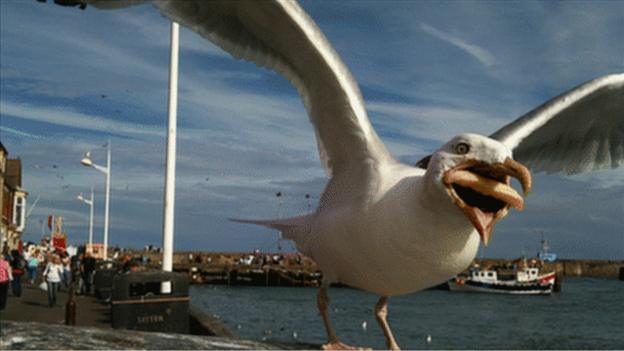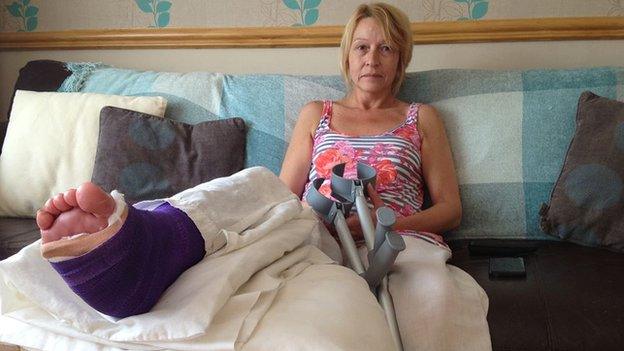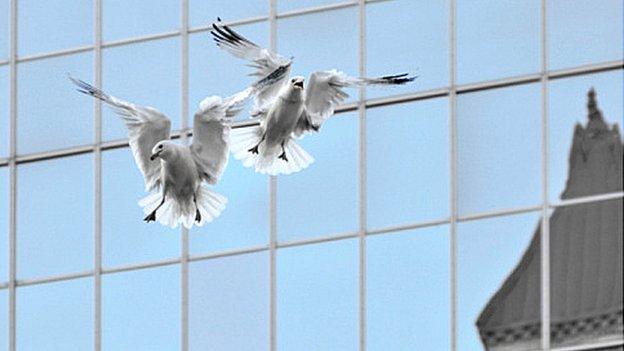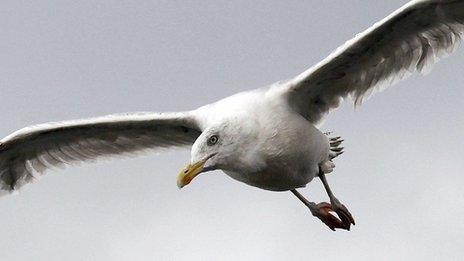Seaside menace: How to avoid gull attacks
- Published

Conservationists said gulls should never be fed either intentionally or unintentionally
As summer approaches tourists will be flocking to the south-west of England offering new opportunities for scavenging seagulls.
Although it can be humorous for some onlookers, for the victims it can be "shocking" and "frightening" and have a lasting impact.
Steven Kendall-Torry, from Sidmouth in Devon, said his six-year-old daughter was "beside herself with shock" after a seagull stole her ice cream from her hand in the town.
He said: "The seagull was bigger than her and it just came from nowhere. She has been very cautious around seagulls since.
"She could have been hurt. It's the bravery of the seagulls that's scary."
'Beady eyes'
In St Ives, in Cornwall, Peter Waller, who works at Willy Waller's Ice Creams, said: "We warn all tourists to shield their ice creams and eat somewhere out of sight. It can be quite upsetting for those who get food stolen.
"They perch on roofs and streetlamps with their beady eyes on someone before they attack.
"We get fed up with it because it puts off quite a few people from buying an ice cream."

Amanda Goodrum tore an Achilles tendon while trying to fend off a seagull
The Dairy Maid Cafe in Teignmouth in Devon gives water pistols to customers so they can target food-stealing gulls.
Assistant manager Clare Everitt said: "They mess everywhere, steal food, break crockery and they attack people. They are frightening, they come down from nowhere.
"People didn't want to sit outside when it was a lovely day because of the risk so we were losing revenue.
"We have about six water pistols with the idea of increasing the number. It really works and reassures customers."
Oliver Twist's Fagin
Attacks have also happened outside the South West. Amanda Goodrum who lives and works in Great Yarmouth, in Norfolk, tore an Achilles tendon while trying to escape a seagull attack after she tripped while fending off the bird.
Dr Viola Ross-Smith, research ecologist at the British Trust for Ornithology, said she was not sure there was evidence to show gull species had evolved to steal food from us, but they were very bold and opportunistic.
Several councils have installed signs warning people not to feed gulls.
Tony Whitehead, from the RSPB, said: "Gulls should never be fed either intentionally or unintentionally. Feeding them or discarding food reinforces their belief that all humans provide an easy food source and reduces their natural wariness of humans.
"How is a gull supposed to distinguish between food offered or intentionally discarded and someone enjoying their own lunch with no thought, or intention, of sharing it?"
Eating food while standing next to a wall or standing under an awning can prevent gulls stealing your food, said Dr Ross-Smith.
"Gulls are reasonably manoeuvrable and are opportunistic. If you wave your arms when they are congregating nearby it will scare them off."
Other birds, such as crows and geese, will steal food but are either not as aggressive or bold and might not be as noticeable as gulls, she added.
"Some gulls are so skilled that the unexpected theft happens with such stealth that Oliver Twist's Fagin would have been impressed," said the RSPB's Tony Whitehead.
In previous years, dive-bombing seagulls, which are protecting their nests and chicks, have caused Royal Mail deliveries to be suspended in roads in Scotland, Devon and Cornwall.
The birds nest on roofs that are safe and predator-free with lots of food close by.
Mr Whitehead said parent gulls had a "real issue with personal space" when nesting and when young birds learn to fly.
"This is when they swing into full protective mode," he added.
In 2010, Gerald Myers from Truro was left with blood pouring down his face when he was attacked by a seagull that was nesting close to his home.
"I went on to my porch and I was hit very hard on the top of my head. It was very frightening.
"It was a big shock and I was bleeding for some time but I didn't go to hospital. It wasn't too deep," said Mr Myers, who was 79 at the time.
'Have an umbrella'
Many councils offer advice on how to prevent gulls nesting on roofs, including erecting nets at potential nest sites.
Mr Whitehead said: "If you have an anxious gull parent to contend with, the best advice is to walk with an umbrella up."
The RSPB said managing nest sites and the availability of food - including using gull-proof bins - could tackle the problems.
In south Devon "super falcons" are being used by three coastal towns in the county to try to stop "nuisance" seagulls disturbing people.
The councils have paid £15,000 for a falconer and his crossed peregrine, gyr and saker falcons to try to deter the birds.
In the UK, all wild birds, their nests and their eggs are protected by law.
- Published11 March 2014

- Published10 September 2012

- Published27 October 2011
